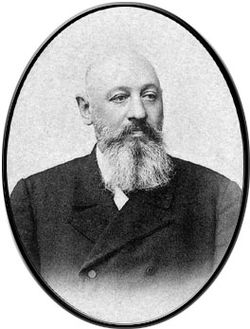| Dmitry Sipyagin | |
|---|---|
| Дмитрий Сипягин | |
 | |
| Minister of Interior of the Russian Empire | |
| In office 20 October 1899 – 2 April 1902 | |
| Monarch | Nicholas II |
| Preceded by | Ivan Goremykin |
| Succeeded by | Vyacheslav von Plehve |
| Governor of Moscow | |
| In office 20 December 1891 – 31 May 1893 | |
| Preceded by | Vladimir Golitsyn |
| Succeeded by | Alexander Bulygin |
| Governor of Courland | |
| In office 31 March 1888 – 20 December 1891 | |
| Preceded by | Konstantin Pahschenko |
| Succeeded by | Dmitry Sverbeyev |
| Personal details | |
| Born | Dmitry Sergeyevich Sipyagin (1853-03-20)20 March 1853 Kiev, Kiev Governorate, Russian Empire |
| Died | 2 April 1902(1902-04-02) (aged 49) Mariinsky Palace, Saint Petersburg, Russian Empire |
| Nationality | Russian |
Dmitry Sergeyevich Sipyagin (Russian: Дми́трий Серге́евич Сипя́гин; 20 March [O.S. 8 March] 1853 – 15 April [O.S. 2 April] 1902) was a Russian politician.
Political career
Born in Kiev, Sipyagin graduated from the Judicial Department of St Petersburg University in 1876. Served in the MVD as Vice Governor of Kharkov Governorate (1886–1888), Governor of Courland Governorate (1888–1891) and Governor of Moscow Governorate (1891–1893). Deputy of the Minister of State Property (1893); Deputy of the Minister of Interior (1894); Executive Director on the petitions of the Imperial Chancellery (1895–1899); Director of the Ministry of Interior (1899); Minister of Interior (1899).
In 1899, during the Russian Student Strike, the government had given Sipyagin "the power of imposing military service as a punishment for acts of civil disobedience towards the University authorities, and themselves to appoint special committees, or rather Courts nominated ad hoc..." He remained the interior minister from 20 October 1899 to 2 April 1902.
He was assassinated in the Mariinsky Palace by Socialist-Revolutionary Stepan Balmashov. His death was a severe setback to Sergei Witte, the finance minister, who had been supported by Sipyagin but would be challenged by his successor, Vyacheslav von Plehve.
Honours
Sipyagin received the Order of Saint Vladimir as an Imperial favour for the New Year 1900, shortly after accepting the position as Minister.
References
- Peter Kropotkin (1902). "Russian Schools and the Holy Synod".
The Council of the Ministers, in which K. Pobedonostsev has a seat in his capacity of procurator of the Holy Synod -- in a 'Cabinet meeting,' as he writes — had thus prepared a law which gave to two ministers the power of imposing military service as a punishment for acts of civil disobedience towards the University authorities, and themselves to appoint special committees, or rather Courts nominated ad hoc, for the purpose of applying that most extraordinary punishment just as they liked.
- Ian Nish (1985). The Origins of the Russo-Japanese War. Longman. ISBN 0582491142), p. 144.
- "Russia". The Times. No. 36039. London. 15 January 1900. p. 6.
| Political offices | ||
|---|---|---|
| Preceded byIvan Goremykin | Minister of Interior 1899–1902 |
Succeeded byVyacheslav von Plehve |
- 1853 births
- 1902 deaths
- Politicians from Kyiv
- People from Kievsky Uyezd
- Interior ministers of the Russian Empire
- Members of the State Council (Russian Empire)
- Monarchists from the Russian Empire
- Assassinated politicians from the Russian Empire
- People murdered in the Russian Empire
- Burials at Tikhvin Cemetery
- Saint Petersburg State University alumni